|
|
|
Sort Order |
|
|
|
Items / Page
|
|
|
|
|
|
|
| Srl | Item |
| 1 |
ID:
118200
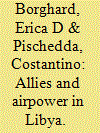

|
|
|
| 2 |
ID:
132322


|
|
|
|
|
| Publication |
2014.
|
| Summary/Abstract |
The phenomenon of suicide attacks has dramatically expanded over the last twenty years, rising from no events in 1980 to a total of 1,398 events by 2008. A prominent theory has argued that suicide attacks are a coercive strategy aimed at ending foreign military occupation by democracies. Yet these conclusions are based on a research design that is affected by selection bias and that fails to distinguish foreign occupations from cases of groups seeking independence or autonomy, which we term domestic occupations. Analyzing an original data set that distinguishes the different types of occupation, we find that only foreign occupations have a strong and consistent effect on the incidence of suicide attacks. The reason, we argue, is that suicide attacks only become cost effective when targets are both hardened and accessible, a strategic environment that is more common to civil wars and foreign occupations than to domestic occupations.
|
|
|
|
|
|
|
|
|
|
|
|
|
|
|
|
| 3 |
ID:
192519


|
|
|
|
|
| Summary/Abstract |
States conduct unclaimed coercive acts, imposing costs on adversaries to signal resolve but denying (or not claiming) responsibility. Some scholars posit that unclaimed acts have considerable potential to coerce targets, while containing escalation risks. Others suggest that unclaimed coercive efforts tend to fail and trigger escalation. We assess these competing perspectives about the effects of unclaimed attacks with a vignette experiment exposing US-based respondents to a scenario where, after Russia warns of unpredictable consequences if NATO continues providing weapons to Ukraine, an explosion occurs at a NATO base in Poland used to funnel weapons to Ukraine. Intelligence agencies and independent analysts identify Russia as the likely culprit, while not ruling out the possibility of an accident. We randomize whether Russia claimed or denied responsibility for the explosion and find that unclaimed acts have lower coercive leverage than claimed ones, but the two do not significantly differ in escalation risk.
|
|
|
|
|
|
|
|
|
|
|
|
|
|
|
|
| 4 |
ID:
151117
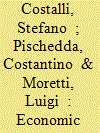

|
|
|
|
|
| Summary/Abstract |
There is a consensus that civil wars entail enormous economic costs, but there is little systematic analysis of the determinants of their heterogeneous destructiveness. Moreover, reliably estimating these costs has proven challenging, due to the complexity of the relationship between violence and socio-economic conditions. In this article, we study the effect of ethnic fractionalization of war-torn countries on the economic consequences of civil war. Building on an emerging literature on the relationships between ethnicity, trust, economic outcomes, and conflict processes, we argue that civil wars erode interethnic trust and highly fractionalized societies pay an especially high price, as they rely heavily on interethnic business relations. We use the synthetic control method to construct appropriate counterfactuals and measure the economic impact of civil war. Our focus is on the years of armed conflict in a sample of 20 countries for which we observe an average annual loss of local GDP per capita of 17.5%, though with remarkable variation across cases. The empirical analysis provides supporting evidence in the form of a robust positive association between ethnic fractionalization and our measures of war-induced economic costs.
|
|
|
|
|
|
|
|
|
|
|
|
|
|
|
|
| 5 |
ID:
171988
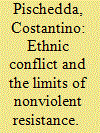

|
|
|
|
|
| Summary/Abstract |
Recent research shows that campaigns of nonviolent resistance are much more successful in producing radical political change than armed rebellion. I argue that the study of nonviolent resistance has paid insufficient attention to a key condition for success—a shared ethnic identity between challengers and government. When challengers and incumbent belong to different ethnic groups, the prospects of campaign success are drastically curtailed, as this situation of “ethnic conflict” inhibits the mechanisms through which nonviolent resistance enables success: emergence of a critical mass of challengers, defection of segments of the security apparatus and the regime inner circle, and development of feelings of sympathy for the opposition cause among key government decision makers. Statistical analysis of all nonviolent campaigns from 1945 to 2006 supports my argument. Nonviolent ethnic campaigns are significantly and substantially less likely to succeed and draw both fewer participants and government defectors than their nonethnic counterparts.
|
|
|
|
|
|
|
|
|
|
|
|
|
|
|
|
| 6 |
ID:
084660
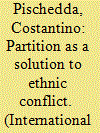

|
|
|
| 7 |
ID:
130938
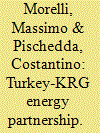

|
|
|
|
|
| Publication |
2014.
|
| Summary/Abstract |
Ten years after the U.S. invasion and two years after the complete withdrawal of American forces from its soil, Iraq faces a number of challenges to its long-term stability and development. These range from corruption to poor public services, from rising terrorist violence to ethnosectarian tensions in the context of a complex power-sharing system. An important, but often overlooked, aspect of Iraq's political scene concerns the dispute between the federal government and the Kurdish Regional Government (KRG) over the management of the country's and the Kurdish region's natural resources and over appropriate revenue-sharing mechanisms. The parties have been stuck in a costly political stalemate for the past few years, as the absence of a federal hydrocarbon law has discouraged international investment in Iraq's natural resources, and oil extracted from KRG-controlled fields has had only intermittent access to international markets.
|
|
|
|
|
|
|
|
|
|
|
|
|
|
|
|
| 8 |
ID:
161213
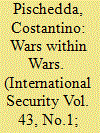

|
|
|
|
|
| Summary/Abstract |
Why do rebel groups often fight each other when confronting a common, and typically stronger, enemy—namely, the government? Inter-rebel aggression is a calculated response by rebel groups to opportunities for expansion and to the threats confronting such groups. In particular, inter-rebel wars occur under the following conditions: (1) when a window of opportunity emerges allowing rebel groups to defeat coethnic rivals at low costs and thus achieve rebel hegemony, or (2) when rebel groups are confronted with a window of vulnerability, in which they experience a radical deterioration of power relative to that of coethnic rivals and then attempt to escape in a desperate military gamble. Both strict military considerations and ethnic identities shape the rebel groups' calculus. Coethnicity influences the threat perception of rebel groups and their ability to grow at the expense of rivals, thus providing both defensive and offensive motives for inter-rebel aggression. Because coethnic rebel groups want to mobilize and control the same ethnic communities, they are highly sensitive to immediate, intense conflicts of interest and see other coethnic rebel groups as serious threats. Moreover, coethnic rebel groups can generally expect to absorb the resources of defeated rivals, which in turn may improve their chances in the fight against the government. In-depth case studies of multiparty insurgencies in Ethiopia's Eritrea and Tigray provinces, based on interviews with former rebel leaders, strongly support the window of opportunity and vulnerability theory of inter-rebel war.
|
|
|
|
|
|
|
|
|
|
|
|
|
|
|
|
|
|
|
|
|